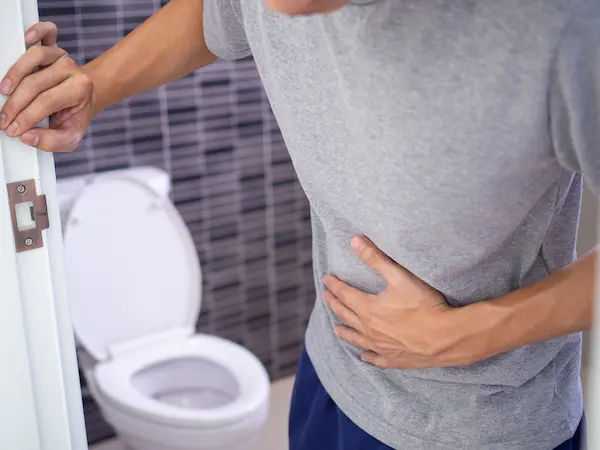What Is Constipation?
Find out what constipation is, the signs to look for, and how it can be treated and prevented. Get useful advice about lifestyle changes that help recover.

Written by Dr Shreya Sarkar
Last updated on 3rd Jul, 2025
One of the most familiar or widespread gastrointestinal disorders is constipation. It is characterised by infrequent or difficult bowel movements, often accompanied by straining, hard stools, or a feeling of incomplete evacuation. Constipation can be due to many factors such as improper eating and drinking habits, sedentary lifestyle, and other diseases. Therefore, understanding constipation is crucial, as chronic cases can lead to discomfort and reduced quality of life.
Causes of Constipation
Constipation may arise from improper diet patterns, lifestyle factors, or even underlying medical or psychological disorders. To deal with and mitigate the condition, it is important to understand the cause of constipation. Some of them are:
1. Dietary Factors
- Low Fibre Intake: A diet low in fibre results in hard stools.
- Inadequate Hydration: People should take 2 litres of water daily. Taking less water results in hard and dry stools.
2. Lifestyle Factors
- Physical Inactivity: Sitting for long hours tends to delay digestion, leading to constipation.
- Ignoring Bowel Urges: Hold-ups on defecation contribute to the formation of hard stools in the long run.
3. Medical and Psychological Causes
- Medications: Some of the medications, for example, painkillers, can lead to constipation.
- Chronic Conditions: Cognitive diseases such as hypothyroidism or irritable bowel syndrome are also on the list.
- Psychological Factors: Tension and stress may inhibit the regular bowel movement.
4. Hormonal and Age-Related Changes
- Hormonal Imbalances: Pregnancy, menopause, or any other hormonal changes are also known to cause delayed digestion.
- Ageing: Elderly people often experience slow bowel movements because of the weakening of the rectal muscles.
Symptoms of Constipation
Constipation has different symptoms, and some of them need medical attention when observed. If these symptoms are checked early enough, the disease can be controlled well. They are:
1. Common Signs to Watch For
- Lack of bowel movements (less than three times a week)
- Hard, dry, or lumpy stools
- Pressures or difficulties to defecate or release bowels
- Belly upset leads to a feeling that some parts of the bowels have not come out
- Swelling of the abdomen or the feeling of fullness
2. When to See a Doctor?
Consult with a doctor if you experience the following signs:
- Constipation that has persisted for more than three weeks despite alteration of one’s lifestyle
- Persistent or acute abdominal pain
- Bloody bowel movements or rectal bleeding
- Sudden weight loss or tiredness, along with constipation
- Signs pointing to sharp impaction-like challenges in passing out either gas or stools
Diagnosis of Constipation
Constipation is diagnosed by assessing the signs, carrying out tests, and eradicating other underlying diseases. It helps to determine the right treatment method. Here is the process:
1. Medical History and Examination
- Assessing the medical history, including symptoms, lifestyle and food habits
- The physical examination is a part of diagnosing blockages or any other abnormalities in the circulatory system
2. Diagnostic Tests
- Blood tests for thyroid or other diseases or disorders of the endocrine system
- Stool examination for detecting infection or signs of malabsorption
3. Specialised Procedures
- Colonoscopies to evaluate colon problems
- Anorectal manometry to identify the nature of muscle function
Complications of Untreated Constipation
If not treated, constipation is known to have severe effects on a given person’s health and welfare. The condition, if ignored may lead to the following consequences:
1. Impacts on Quality of Life
- Chronic Discomfort: These symptoms include acute abdominal pain, bloating and discomfort. It impacts daily life.
- Reduced Productivity: Digestive discomfort and, thus, poor concentration and fatigue may result in a lower level of productivity.
- Social Withdrawal: Chronic digestive problems may result in embarrassment or anxiety, thus causing people to withdraw from some social activities.
2. Potential for Serious Medical Conditions
- Haemorrhoids and Rectal Bleeding: Extending the time that a person spends on defecation may lead to the formation of haemorrhoids or develop bleeding around the rectum.
- Faecal Impaction: Untreated constipation may culminate in severe obstruction, which demands operative measures to eliminate the stool from the colon.
- Colorectal Disorders: Prolonged constipation raises the likelihood of complications like diverticulitis or even colorectal cancer.
Treatment Options for Constipation
Medical management of constipation involves recognition of the symptoms and then deciding on the right course of treatment. The options include:
1. Dietary and Lifestyle Modifications
- Increase Fibre Consumption: Dietary fibre, such as green vegetables, fruits, and whole grains, can assist in easing constipation.
- Hydration: Drinking adequate water throughout the day supports digestion and softens stool consistency.
- Physical Activity: Exercise helps to stimulate bowel movement, preventing constipation.
- Establishing a Regular Bowel Routine: Scheduling bowel movements is suggested as this would make the body’s natural bowel movement more regular.
2. Medications and Laxatives
- Over-the-Counter Laxatives: Stimulant laxatives, osmotic agents, and stool softeners can help to relieve constipation quickly.
- Fibre Supplements: If the amount of dietary fibre consumed is inadequate, supplements such as psyllium husk can be used.
- Prescription Medications: Lubiprostone and linaclotide help with bowel movement but are mostly used for chronic constipation.
3. Advanced Medical Treatments
- Biofeedback Therapy: Applied to people with pelvic floor dysfunction to stimulate muscles that help in defecation.
- Surgical Options: In cases of extreme, long-standing, persistent constipation, further invasive intervention can be performed, for example, colectomy or resection of the colon.
- Enemas and Manual Removal: In some cases of severe faecal impaction, enemas or manual evacuation may be required by a healthcare professional.
Prevention of Constipation
With the right prevention strategies, it is possible to avoid constipation and enhance digestive health. Here is how:
1. Daily Habits to Reduce Risk
- Consuming ample amounts of fibre, fruits, vegetables, and whole grains will go a long way in the prevention of constipation.
- Adopting daily exercise, like walking or swimming, results in an improvement in digestion and minimal cases of constipation.
- Consuming enough water throughout the day can help avoid instances of dehydration, one of the primary causes of constipation.
- The elimination of low-fibre and processed foods enhances regular bowel movements.
2. Tips for Maintaining Bowel Regularity
- Going to the bathroom at one particular time each day assists in training the body clock and efficiently helps to regularise the activity.
- Quick response to body signals minimises chances of constipation and retention of stool.
- Failure to yield to the urge or just holding the urge makes the stool hardened and difficult to pass.
- Exercises like deep breathing, yoga, or meditation can control stress, which can disrupt bowel movement.
Special Considerations
Constipation may manifest and be managed differently in certain groups of patients. These considerations remain paramount to prevent or manage patient issues effectively:
1. Constipation in Children
- Fibre-rich diets, especially fruits and vegetables, can give children a solution to constipation.
- One has to consult a paediatrician if a child often suffers from this problem.
2. Constipation During Pregnancy
- Fluctuation of hormones during pregnancy will trigger slow movements of the gastrointestinal tract, thus making pregnant women vulnerable to constipation.
- Any drug or treatment should not be taken while pregnant without consulting a doctor.
3. Constipation in the Elderly
- Older persons experience constipation because of physical inactivity or the use of some drugs.
- For older patients, it is recommended to perform relatively invasive treatments and make changes in diets.
Managing Chronic Constipation
- Chronic constipation requires focusing on diet, physical activity, and even drugs often.
- Outpatient treatment must be supervised by a doctor, as otherwise, the patient’s condition might worsen.
Conclusion
Hence, constipation is a typical condition which can be effectively controlled. Its appearance depends on diet, exercise, and certain underlying diseases. However, by identifying the symptoms, knowing the causes of constipation, and identifying ways of prevention and treatment, people can easily manage constipation. Correct diet and fluid intake, regular exercise, and taking medical advice when required – are the keys to preventing constipation, thus promoting better health and quality of life.
Consult Top Gastroenterologist
Consult Top Gastroenterologist

Dr. Umakanth Eskala
Gastroenterology/gi Medicine Specialist
16 Years • DM (GASTRO)
Visakhapatnam
Apollo 24|7 Clinic - Andhra Pradesh, Visakhapatnam

Dr Harish K C
Gastroenterology/gi Medicine Specialist
15 Years • MBBS MD DM MRCP(UK) (SCE-Gastroenterology and Hepatology)
Bengaluru
Apollo Clinic, JP nagar, Bengaluru

Dr Rohit Sureka
Gastroenterology/gi Medicine Specialist
15 Years • MBBS, DNB General Medicine, DNB Gastroenterology
Jaipur
Apollo 247 virtual - Rajasthan, Jaipur

Dr. Jatin Yegurla
Gastroenterology/gi Medicine Specialist
11 Years • MD (PGI), DM (AIIMS Delhi), FAGIE (AIIMS Delhi), ESEGH (UK), Gold Medalist
Hyderabad
Apollo Hospitals Jubilee Hills, Hyderabad
(625+ Patients)

Dr. Chethan T L
General Physician/ Internal Medicine Specialist
5 Years • MBBS, MD, DNB (General Medicine)
Bengaluru
Apollo Medical Center, Marathahalli, Bengaluru

